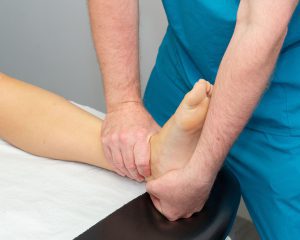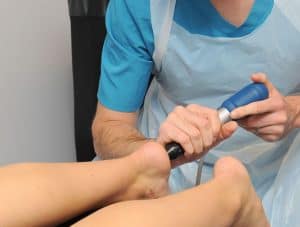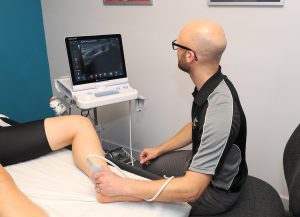Plantar Fasciitis
Plantar fasciitis is a painful condition that affects the sole of the foot, typically at the heel. The plantar fascia is a thick fibrous band of connective tissue that runs from the heel bone (calcaneus) to the base of the toes. It’s job is to support and transmit load through the foot.
In plantar fasciitis (also known as plantar fasciopathy) the plantar fascia become irritated and there may be inflammation present. The tissue can also become swollen and typically causes pain on weight bearing. Pain can be worse in the morning and on initial movement following a period of inactivity; so called ‘start up pain’. Many treatments and therapies are available, however the ones with the best evidence to support their use are:
- Physiotherapy based rehabilitation
- Shockwave Therapy
- Steroid injection
A physiotherapist will initially fully assess the condition to ensure the diagnosis is correct as there can be several other conditions that present in a similar fashion to plantar fasciitis. On occasion, a diagnostic scan, such as an ultrasound scan, may be required to confirm diagnosis and may also detect associated heel spurs (a small protrusion of the heel bone). Ultrasound scans can be performed in-house at Life Fit Wellness. The physiotherapy assessment will also look at causative or contributory factors such as joint mobility, muscle flexibility and strength as well as how an individual moves (i.e. biomechanics, walking or running gait).
Following diagnosis, the first line of treatment is usually focussed on strength-based rehabilitation, however stretching and programmes to address biomechanics may also be integrated within the regime. This is often supplemented with manual therapy (massage and joint mobilisation) to assist with pain-relief and improving associated limitations in movement. Guidance will also be given on how to grade your return to activity (i.e. advice on facilitating a return to usual exercise or sport). This approach can be very successful, however it can often take a number of months to make a full recovery.
Should the condition fail to recover following the above approach, there is very good scientific evidence to support the use of Shockwave Therapy in the treatment of plantar fasciitis. Shockwave therapy is a non-invasive form of treatment that involves passing high energy pressure waves into the affected tissue via a hand-piece. Shockwave works best alongside an appropriate rehabilitation program and guidance on what to do surrounding treatment applications; with the shockwave therapy service at Life Fit Wellness delivered by highly experienced physiotherapists, patients receive a full and integrated package of care to maximise recovery.
Injection therapy can be considered for highly irritable forms of plantar fasciitis and those who have failed to respond to the treatment methods described above. Multiple studies have shown ultrasound-guided steroid injections to be effective and safe in the treatment of plantar fasciitis. As with shockwave therapy, the Life Fit Wellness ultrasound-guided injection service is integrated within the physiotherapy service which enables important rehabilitation and management advice to provided alongside the administration of an injection.












